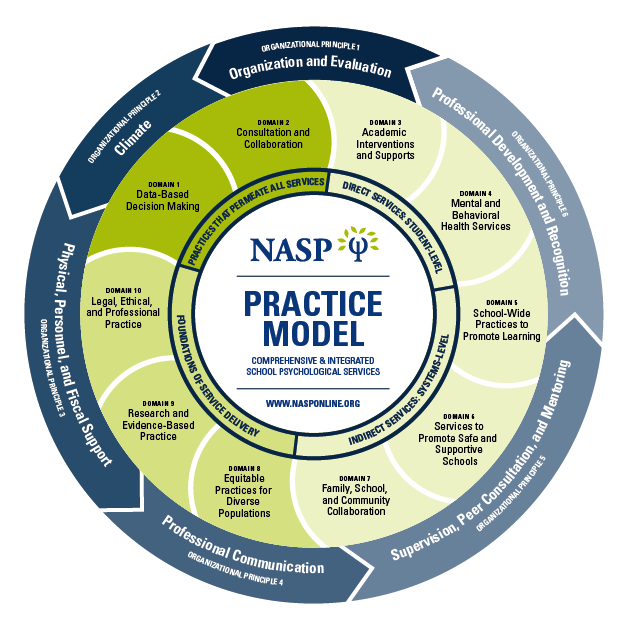Program Information
The Master of Education of School Psychological Examiner aligns with the National Association of School Psychologists' professional standards to assess cognitive and academic abilities, or describe behavior, personality, or aptitude of P-12 learners in order to determine eligibility for services.
As a demand for child psychological services is projected to increase over the next decade, candidates in this program will learn the necessary skills and knowledge to make a difference and improve the psychosocial and academic success of children in P-12 schools.
-
Interactive, distance learning classes offered fully online, synchronously.
- No entry exams required along with no dissertation work with part-time or full-time enrollment options.
-
8 : 1 student to teacher ratio providing candidates the opportunity to work closely with our talented and passionate faculty.
-
Advanced research opportunities for candidates to participate on grant funded faculty research on the regional, national, or international levels.
-
Admitted students can learn more about qualifying for scholarships and in-state tuition.
Candidates usually enter the program with a bachelors's degree and complete the M.Ed. of School Psychological Examiner and then continue their study by applying for the Educational Specialist in School Psychology program. Our 64 credit Education Specialist in School Psychology aligns with the National Association of School Psychologists’ professional standards and is the minimum preparation level for school psychologists and special education directors in most states. This program can lead you to licensure/certification as a school psychologist in Idaho.
-
For licensing requirements in other states, visit: NASP-State School Psychology Credentialing Requirements.
- Course Requirements Checklist
- Program Handbook
Application, Funding, and Support
Admission and Program Requirements
Candidates for the M.Ed. in School Psychological Examiner must meet the ISU Graduate School admissions requirements for admission and retention Preference is given to applicants with an undergraduate major in psychology or education (including special education) and a GPA above 3.0. Applications must include at least two letters of recommendation and a personal statement of interest and goals. The preferred deadline to be considered for summer semester admission is January 1st. If there is availability, we do accept some competitive students after January 1st. Our program admits about six to eight students each year.
Our students usually enter the program with a bachelors's degree and complete their M.Ed. of School Psychological Examiner before being accepted to continue their study toward an Ed.S. degree. Other master’s degree majors in a closely related field may be approved upon recommendation of the selection committee. However, they may be required to take additional, prerequisite coursework.
General Requirements
Students completing a Master of Education in School Psychological Examiner must complete both a written comprehensive examination and an oral examination.
Time Requirement
All requirements for the M.Ed. must be completed within a period of eight years from the date of completion of the first course to be applied toward the degree.
ISU Course Catalog
Career Opportunities
Graduates with a mater of education of school psychological examiner degree could be qualified for the following types of positions:
- Public School Psychological Examiner
- Private Clinic Practice
- Post-Secondary Practitioners
- Hospital Practice
- Private School Psychological Examiner
- School-Based Mental Health Center
- Community Day Treatment Center
- Trainer of Teachers, Health Professionals, Care-Givers
- Juvenile Justice Program
Job Outlook
Because school psychologists are highly desirable in today’s job market, the job outlook includes:
- Near 100% job placement rate
- Average salary (according to onetonline.org) is $84,940 for school psychologists in the United States and $74,160 for school psychologists in Idaho.
NASP Practice Model

What does it look like?
- Data-Based Decision Making:Our students will be able to impact children through the collection, interpretation, and use of data. They will be able to use this data to create appropriate interventions.
- Consultation & Collaboration:Our students will be able to indirectly impact children through consultation and collaboration with teachers, families, systems, etc.
- Support of Academic Skills:Our students will be able to impact children through their expertise in learning and developmental theory, and academic intervention strategies.
- Support of the Mental Health, Social & Life Skills:Our students will be able to impact children through their expertise in mental health.
- School-Wide Interventions:Our students will be able to indirectly impact children through their knowledge of system theory and their expertise in the creation of system wide change.
- Preventative & Responsive Services:Our students will be able to impact children through their knowledge of resiliency, protective and risk factors and their experiences in implementing preventative services.
- Family-School Collaboration:Our students will be able to impact children through their ability in bridging the connection between school and family.
- Diversity Practice:Our students will be able to impact children through their awareness, knowledge, and skills in the area of diversity. This competency is imbued throughout their practice. They will be seen as a beacon of inclusion and culturally competent practice.
- Research & Evaluation:Our students will be able to impact children through their knowledge of research, statistics, and program evaluation. They will be able to use this information to make real world positive impact within the schools.
- Legal & Ethical Practice:Our students will be able to impact children through advocacy and ethical practice. They will standup for the rights of our students and always perform in a legally and ethically exemplary manner.

Dr. Joel Bocanegra
Professor of School Psychology
Office: College of Education 108A

Erika K. Coles, PhD
Associate Professor of School Psychology
Office: College of Education 107 A

Chung-Hau (Howard) Fan, PhD
Program Coordinator | Professor of School Psychology
Office: College of Education 108B D

